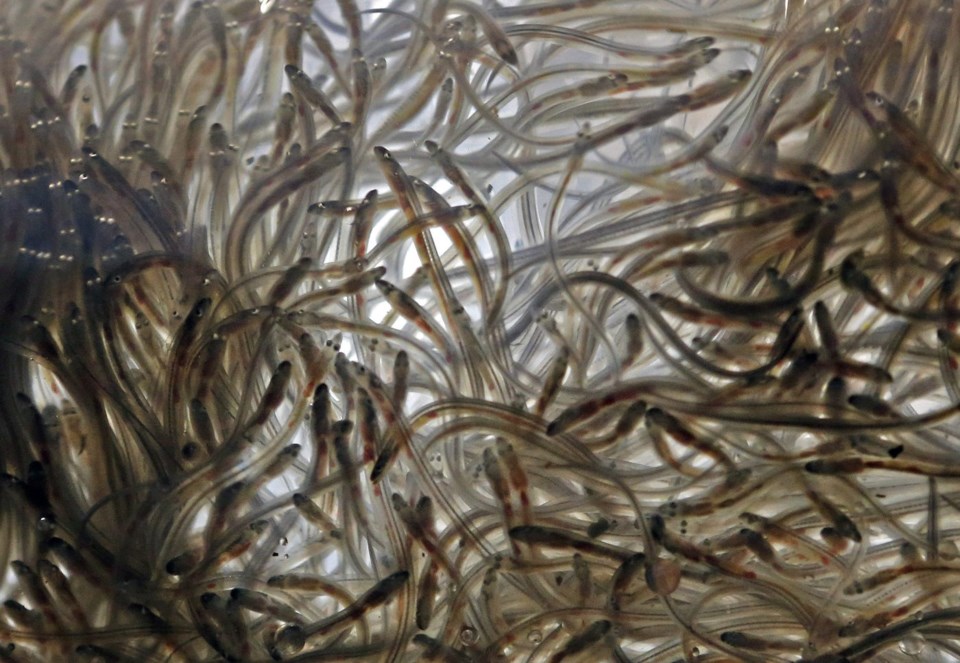HALIFAX — Commercial elver fishers in the Maritimes are dismissing new quotas for the 2025 season, saying they would significantly cut their share of the lucrative baby eel fishery.
In a letter obtained by The Canadian Press, the federal Fisheries Department said Thursday it wants to hand 50 per cent of the total allowable catch — 4,980 kilograms — to First Nations fishers.
However, in a potentially contentious move, the department is proposing that another 28 per cent of the allowable catch — 2,812 kilograms — should go to a new pilot project.
The department's plan calls for distributing that 28 per cent among people who are already involved in the fishery, including those who are working for commercial elver fishing enterprises.
That means the nine existing commercial licence holders will be left with just under 22 per cent of the total catch, which has been held at 9,960 kilograms since 2005.
“The minister of Fisheries and Oceans supports broadening the distribution of benefits of the elver fishery,” wrote Jennifer Ford, director of the federal elver review team for the Maritimes.
In the letter, Ford explains that the goal is to increase the participation of First Nations, while also providing licences to people already involved in the industry or are willing to temporarily relinquish eel licences.
“When the total allowable catch for a fishery remains stable … quota redistribution is the only way to bring new entrants into the fishery without putting additional pressures on the stock," the letter says.
Meanwhile, commercial licensees stand to lose between 60 per cent and 90 per cent of the quota they fished before 2022.
On Friday, commercial licence holder Stanley King said the proposed allocations will cause more chaos in a fishery that was shut down last year because of violence and unauthorized fishing.
King said the pilot project makes no sense because it redistributes quota among employees working for companies such as his own.
“The government is saying anyone who’s worked for you is now going to have a piece of your business,” said King.
“Some of our (nine commercial) licence holders have been cut so much that they will barely have more of the company than their former employees. It’s a slap in the face and it’s completely anti-business.”
Under the proposed pilot allocation, the federal department is offering licences to 120 fishers currently employed by commercial licence holders, representing 27 per cent of the overall quota. A further 1.5 per cent would be allocated to licences offered to 30 fishers who currently catch adult eels.
King said if the department’s proposal moves forward, it would decimate his company, Atlantic Elver Fishery Limited, without providing any compensation.
“Our business is about 20 people and what we’ll be left with will be the owners and managers, who will basically have to fish for themselves,” he said. “We won’t be able to afford to hire anyone.”
Michel Samson, a Halifax-based lawyer who represents Wine Harbour Fisheries Ltd., a family-run business on Nova Scotia’s eastern shore, said his clients would go from a pre-2022 quota of 1,200 kilograms to 137 kilograms under the proposed change.
“We are at a loss to understand why (the department) has decided to take what has been a successful fishery and somehow completely dismantle it to bring in new entrants,” Samson said.
“In our case, it’s even more perverse in that it’s the licence holder’s wife and children who have been offered quota.”
Samson said licence holders have accepted the need to increase the participation of First Nations as part of Ottawa's reconciliation efforts. But he says they’ve been left scratching their heads otherwise.
“This whole pilot project … we just can’t understand what the logic is behind this,” Samson said.
The federal Fisheries Department was not immediately available for comment on Friday, but in its letter to fishery participants, it said written feedback on the quota redistribution would be accepted until Dec. 16.
This report by The Canadian Press was first published Dec. 6, 2024.
Keith Doucette, The Canadian Press



